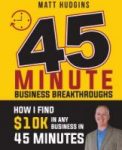Every small business out there is dealing with the impact of COVID-19 in some capacity. So, we thought it would be beneficial to reach out directly to the small business community and find out the biggest lessons that they have learned during this pandemic. The insightful CarolRoth.com contributor network of business owners, experts, advisors and entrepreneurs have graciously shared their biggest business lessons that they have learned below, in no particular order.
You may notice some similar ideas listed, but I kept them separate, as something in the way one is framed may resonate differently with you.

1. Stay Ready for the Unexpected
The events of 2020 have taught us this — we never know what life-altering event is right around the corner. As small business owners, we HAVE to stay ready. This includes having a business continuity plan, keeping our cybersecurity systems up to date, and maintaining detailed records of our operations. Business owners who did not have these pillars in place found it challenging to pivot and take advantage of resources such as the PPP program. Commit to getting your house in order and stay ready.

2. A Small Start-up Thrives
A huge lesson that our team learned is that you need to be lean and not be afraid to step out of your comfort zone to expand with the growing needs of your industry. We were able to completely transform our primarily outdoor activity line and expand into virtual events and indoor activities. We utilized existing technology and a collaborative team environment to get things done.

3. Never Stop Marketing
Before Covid, I had 2 businesses that were so busy I was turning work down. After being an entrepreneur for most of my life, I know business is always up and down. But, when you're really busy working, it's easy to forget that you still need to spend time marketing and getting new customers, even if you think you can't handle any more. After Covid, I lost most of my customers for reasons that had nothing to do with me, but getting new ones now is extremely time consuming. Never stop marketing!

4. Alter Messaging Tone
We learned that when interacting with customers during tough times, it's best to keep your messaging "away from pain" focused. The usual "towards pleasure" approach doesn't really resonate and it could even turn off prospects and customers.
A business would greatly benefit from being aware of the acute difficulties and challenges of their customers (even more so during a crisis).
It's important to alter and adapt all the relevant marketing copy (email, ads, etc.) accordingly.

5. We Are All Stronger Together
I have always been a fan of partnerships. I was raised on the belief that "we are all stronger together". COVID-19 has solidified this thought and belief in my mind like no other time in my 50+ years on this earth.
Realizing that through partnerships 1+1=3 and that your work is far more valuable when part of something bigger is freeing.
Partnering has helped me develop a new leadership community and book and enabled me to find new sources of revenue when 9 months of stages disappeared.

6. No Sacred Cows
Perhaps the single biggest lesson we learned has been the importance of flexibility and adaptability. We’ve tried to stay away from adopting anything as dogma. There are no sacred cows - everything needs to constantly be tested, evaluated, and proven.

7. Tell Your Story Near & Far
In today's COVID-19 climate, small businesses must be willing and prepared to tell their story across many platforms and have their own platform. They do not need to be on everything; however, with automation tools and planning, a FACEBOOK post or an article could be adopted to many uses. The Business must devise content before it is used to assure a steady stream of information. If time is an issue in keeping a steady stream, it is important to get reliable outside help.

8. Innovation and Improvement
Hanging on to the way you've always done things will keep you stuck. Whether you're unable to do business as usual due to a crisis, or you have an ongoing goal of making your company better (i.e., more efficient systems, better customer experience, stronger teams), each day is an opportunity to pause to ask yourself how you can innovate and improve.

9. Stress is Not Just on You
One of the biggest items I learned is that the staff has a lot of stress on them daily, not just you as a leader. Make sure you are careful to take into account that your staff needs some additional love and care, as they are not only thinking about your customers, but their family, friends and co-workers.
So, I hope leaders run with empathy and compassion going forward...
Thanks to: Christopher Carter of
Approyo.

10. Overcommunicate!
Even if your business is closed, it's critical to over communicate with customers about the status of your company and topics they can relate to! They need it now more than ever!

11. Lighten Your Load
In the old movies, when a ship is caught in a storm, the wise captain orders the crew to lighten the load to help steady the helm. That’s still good advice. Don’t try to do everything, just keep doing something. Stay afloat. Streamline operations to what you can most easily manage. People will know you are doing your best. Don’t pretend things are normal – they aren’t, and trying to operate that way is like bailing with a tea cup in a gale. Streamline your operation and maximize service.

12. Closed Mouths Don't Get Fed
So, when California first locked down for Covid-19, I knew I had a problem. My business delivers to homes, so I could technically be open, but my wine was stored at a non-essential location. During that time, I told my email my somewhat hilarious situation and sales went up almost immediately. Normally, I think small business owners don't want to show anything as not going well, but there were thousands of dollars of sales that came in, simply because I told people what was up.

13. Build a Support System
A month into quarantine, I decided to pull the trigger on hiring more help with the blog. I brought on a managing editor to help with the content calendar, edits, and working with freelance writers. We codified a process, which is always evolving, so that the site would operate even if I wasn't running it 100%. It's been amazing because the business continues forward even if I am distracted because I'm stuck at home helping manage a family.

14. Avoid Pause Buttons
My biggest lesson from this madness is we're not going back, and hitting 'pause' until we do is a mistake.
In March, I purchased a new camera, tripod and backdrop to do more video content. My kids' preschool closed the next day, and they've been home since. Instead of figuring it out, I've been waiting for school to re-open.
I've learned that's the wrong thinking. We don't know when or if about anything, and we need to figure out how to make it work NOW instead.
New videos coming soon!

15. Pay Close Attention
Energy flows where your attention goes ~ Anthony Robbins
It's really important as an entrepreneur to pay close attention to what we consume (I remind myself daily).
We can easily get caught up watching negative headlines and focusing on our circle of concerns or we can stay inside our circle of influence and focus on what we know we can control (our business).
Turn off the media and turn on serving your customers. They want your positive energy and not another opinion on world events.

16. Build a War Chest of Cash
The biggest business lesson I've learned from the COVID-19 pandemic is that you should have and maintain an emergency fund.
I saw so many businesses struggle after the first few weeks because they didn't have the money to pay their expenses. These were the same companies that had fancy offices, lots of fluff in their balance sheets, and more.
Your war chest should be your first priority. It's what enables you to STAY in business when things get tough.

17. Flexible Systems & a Database
During COVID-19, I've learned the importance of having a flexible, adaptable business model and operating systems. When the stay-at-home orders came down, I was able to pivot my entire music school business online & never missed a day of lessons. As I am now slowing easing back to "normal", I take comfort in knowing that I can adapt my business to whatever situation may arise. Putting the time each week into creating & building a database based around technology to utilize it really paid off.

18. Communicate Your Needs
In times of distress like COVID-19, its essential to communicate to your customers how they can help your small business. Providing actionable items for your customers allows them to adjust their expectations and will further your professional relationship. We published a blog post letting our clients know how they can support businesses like ours without spending money–simple tips that make a big difference. We received positive feedback from clients who were happy to be part of the solution.

19. Diversify Your Income
The pandemic brought unpredictable changes in the way many companies do business. Reliant on foot traffic? Some traditional brick and mortar businesses found themselves at risk of shutting down. The more diverse your different income streams, the easier to weather a COVID-19 storm. Can customers order products or services online? How can you better engage with customers through blogging or email marketing? This "wake-up call" has forced many entrepreneurs to step up their digital marketing.

20. Be Prepared
Perhaps that is cliched, but it is applicable. On a business and professional level, I was ready for a major event, though not specifically COVID-19 and the protests. Regardless, the financial and mental preparedness has allowed me to navigate current events. Though stressful, since I was already prepared for an event, this happening was a lesson that being prepared pays off.

21. Communication is Key
1. Communication Is Key: Uncertainty brings doubts in their minds. Being clear and straightforward is important. Send an email, voicemail or an interesting article to let them know you're thinking of them.
2. Always Add More Value, Personally and Professionally: What else can you help them with? Who can you connect them with?
3. Plan Ahead: This Crisis showed us how important it is to have a "Plan" in place.
Challenges are actually "Opportunities" for you to grow your business!

22. Empathy Means Everything
On a personal note, the biggest lesson I've learned is that a little bit of empathy goes a long way. My son has many special needs and requires 24-hour supervision and my company Minuteman Press International has worked with me to make sure I can help care for him. The businesses that show empathy towards employees and customers will be fondly remembered for years to come. There is nothing more powerful than putting yourself in someone else's shoes and then doing something positive to help them.

23. The Team Deserves More Trust
Despite switching into remote work, I didn’t witness any productivity downturn. Moreover, I’ve seen an increase in engagement. The team understands that we are in the same boat and need to walk the extra mile to pass through the hard times and prepare for the new post-covid reality. It was a great pleasure to experience such a high level of maturity and motivation. I am more than sure now that I can rely on my team.

24. Make Change Part of Your DNA
We need to make sure we keep our workflows and routines flexible. There’s always an area for improvement, and we need to have the culture to search for these areas and make the necessary changes continually. If the organization is not used to making changes, it will find it hard to pass through the crisis times when changes are a matter of business survival. The ability to change is a skill that requires training and acceptance by the whole organization.

25. Rethink Your Logistics
Many of us used to think of the cost as the primary factor in designing the logistic chain. The pandemic taught us the hard way that the sustainability factor was massively underestimated. Relying on low-cost overseas suppliers and low stock levels may be a good way to optimize investments. At the same, now we see the associated risks when businesses that didn’t have contingency plans had to terminate their operations.

26. Switching Tactics is the Sauce
The "old school" model for a new consumer good to gain presence in an existing market was to toil away at getting the attention of a select few retail mangers and buyers. By adjusting our efforts to match the rapidly evolving online shopping habits, we are seeing our direct to consumer demand "surge' like never before. We have been able to appeal to the investment in self that many are making and inform them about our brand of barbecue sauces and rubs and the story behind them.

27. It's Always About People
We know it to be true, yet we often forget that business is always about people. Keeping this in mind during the pandemic, I stayed in touch with my clients and associates in ways that larger businesses may not have been able to keep in touch with theirs. As a result, I am coming out of this difficult time much better off than I had initially anticipated -- in a business sense and, more importantly, in an emotional one. I count myself fortunate to work with such fine people.

28. Backup Plans for Supply&Demand
Sometimes, you've just got to mess with the Laws of Supply and Demand and have backup plans for whatever might happen to your business, whether it's something like the Coronavirus or a natural disaster, because you never know what may happen to disrupt the laws of supply and demand in your business... AND WHEN THAT TIME COMES... put on your thinking cap and take a look at all the new marketing opportunities (and obstacles to overcome) and then, adjust your advertising to take advantage of them.

29. Don't Get Pitch Pigeonholed
As a digital marketing company, the biggest lesson we learned during the COVID-19 pandemic was that there is no reason we need to restrict our sales process based on regionality. Meetings done through Zoom and other conferencing apps make it simple and easy to pitch clients all over the country. We have realized the need to diversify our client base and expand to more industries, so we aren’t pigeonholed when the next disaster strikes.

30. Online Presence Is Important
COVID-19 affected a lot of small businesses, as customers who patronize them were indoors trying to protect themselves against the virus. But, even with that, some small businesses who have an online presence were able to operate. Goods and services were exchanged for money online. That's one biggest lesson small businesses should learn. Having a presence online is necessary, especially in this digital era and small businesses shouldn’t neglect it.

31. Don't Sell. Educate!
One of the biggest lessons we've learned is simply providing education as it relates to our industry produces more revenue than selling our services. We pivoted our focus from providing education through the sale of our services to making education readily available to our audience in a 100% online format through our social media platforms and online communities, email campaigns, and our online academy, Financial Literacy University. Doing so has increased our gross income by 123% thus far.

32. Focus on the Grand Plan
In business, there are times when shiny offers will come your way and might be so attractive that you find it difficult to reject.
Reject the offers, if it's not part of the plan. You must already have some business plans and goals, so cross-check with yourself if the offer at hand aligns with the plan.
Like I said, it could be difficult to reject them, but you have to if it's not going to help you achieve your goals.
Some shiny offers can rob you of a long-term dream.

33. Stop Following Financial Media
As a news junkie, I love reading about anything business related. In the age of the Internet, “news” is often more about generating clicks to a story. During times of stress, we all want answers. When will the virus end? What resources are available to help me? STOP! The financial media is notorious for offering such “clickbait” stories. If you’re feeling financial stress, take a media break and see if you don’t feel a little calmer.

34. The Silence Had a Loud Message
When COVID-19 struck and consumers couldn't walk through the door of their favorite stores, many brick-and-mortar businesses struggled to stay in-touch with customers. This loss of communication caused revenue streams to dry up, in most cases, completely and overnight. Now, businesses must invest in building digital lines of communication with their customers. They must identify the platforms where their audience is, and create a strategy to maintain meaningful online relationships with them.

35. Do a "Search" on Networking
Do a Google search on networking events. There are thousands of them happening around the country, and elsewhere. You have an unprecedented opportunity to make connections that you could never have made before.

36. Recession-Proofing
The advent of Covid-19 proved that businesses with agility of online AND brick-and-mortar operations are recession/pandemic-proof. A gallery/gift shop with an online shop that sold primarily in-store ramped up its dormant online shop to accommodate contact-less shopping options and started selling online for the first time.
Business models that don't have the flexibility to transform quickly and be nimble can't survive through man-made or natural disasters.

37. Taking the Time to Listen
The greatest lesson I learned from the Covid-19 pandemic is that when you take the time to listen, things improve. During the pandemic, we took some time to evaluate our customer's journey as we provide our patent and trademark services and found several areas to improve. Once we made those improvements, our customers have been happy and business has picked up to a higher level than before the pandemic.

38. Do Not Rely on Word of Mouth
During the pandemic, I had to learn the hard way that one must not rely solely on word of mouth for service-based businesses. The pandemic has made me open my eyes and realize how important it is to have a digital presence.
I run a migration agency, and now have a strong digital presence on social media and search engines through SEO. Now, I can stop neglecting marketing and start soaking in the benefits from my digital marketing investment + word of mouth.

39. Be Prepared for Anything!
As an affiliate marketer, I learned that not all niches are created equal.
Some fell flat during the COVID pandemic, while others rose beyond anyone's wildest guess.
The lesson here for anyone starting their business today is to take into account whether their niche will be profitable even at the times of global health crisis.
As for people already running a small business and who were badly affected, COVID has shown they need to have a backup plan. Plan B, and maybe even plan C.

40. Be Sure to Pivot, Not Panic!
We learned to use Strategic Procrastination to our benefit. In the midst of a quickly changing landscape, the first response may not be the best one. It is important to be disciplined enough to step back and read the horizon before shifting your business. Assess each change against your business model to ensure it complements your core activity. The sweet spot is in creating a new product or opportunity that sustains well past Covid (Pivot) rather than a short-term reactive response (Panic).

41. Flexible, Discerning & Haste
During the Covid-19 period, I learned to be flexible, quick to decide, and understand what customers want during that period.
Since we are a photography studio, we are not able to meet anyone, so we moved towards teaching online, like using your smartphone to take high-quality product photos and basic photography principles.

42. Advocating for Work at Home
The best lesson I have picked up from the work-at-home restrictions is this: what a gift it is to be forced to stay at home and concentrate on business development and strategy that always got pushed aside before. No more hours of time driving to networking meetings and spending money on gas, meals with prospective referral partners and fatigue from being on the road constantly. I have been forced to be very strategic about which connections are most valuable and I have time to think!

43. Show Humanity & Compassion
It's about touching people in meaningful ways. Online meetings, webinars, social media are smart/productive ways we can have conversations that educate/inform, build relationships and move forward during this crisis. Maybe the silver lining is that we have always needed each other and everyone is struggling right now to find a new normal, so the key is to show our humanity and compassion. Technology does not have to be isolating; it can be used to build our real communities/relationships, too!

44. Remote Work Kills Innovation
Our biggest business lesson learned from the COVID pandemic is that working from home stifles innovation. It has become plainly evident during the pandemic that face-to-face interaction is at the heart of our company's innovation and creative process. Without this interpersonal communication, the flow of new ideas has come to a crawl. Because of this, following our return to the office, we plan to double down on in-person content creation meetings and scale back our remote working policy.

45. Make Social Media Crisis Plans
You never know when the next crisis will hit. As we're seeing now, you also may not know what kind of crisis your business will face. Developing social media crisis plans can help share your message appropriately and ensure you don't miss a critical step, even when you must adapt to an unexpected disaster. For example, you should know who needs to work on your messaging or approve it during a crisis, and you should have policies in place to review all current and upcoming content.

46. Be Flexible & Learn to Adapt
The biggest lesson learned from the Covid-19 pandemic is to be open-minded and flexible. Our business strategy has transitioned due to coronavirus from our business being conducted in the physical office to instead marketing all of our legal service products online. Our marketing efforts and strategic objectives have flipped 180 degrees since the coronavirus forced clients to obtain legal advice all online. It has been critical for us to rethink the way we do business and be open to change.

47. Future-Proof Contingency Plans
Without a doubt, the biggest lesson I’ve learned from COVID-19 is that we have to be flexible and fluid like water. Water can change course overnight simply because of the wind, tide, and climate. If a business is not capable of quickly adapting to a change of conditions, then the water will submerge the business. To combat that, we now hold regular meetings to plan for contingencies and to future-proof our business model. While this wasn't pre-planned, it will benefit our firm indefinitely.

48. Embrace the Opportunity!
The biggest lesson learned from the pandemic: embrace opportunity that presents itself. Trying to fight the tide will only make you weaker. The pandemic has made us stronger and more resilient as a business. Our goal was to try to grow despite the headwinds. We were faced with a number of challenges on how to make it happen. We experienced a few dead ends in the last three months, but we’ve embraced the opportunity and are emerging stronger, smarter, more resilient and larger!

49. People Matter!
Throughout the COVID-19 pandemic, one of the most important lessons we’ve learned as a company is that every team member needs to feel valued and supported. When times get tough, we’re reminded that we’re all human, and how we treat one another matters. It’s important that we always show empathy and understanding, and take the initiative to start challenging conversations regarding mental health to promote growth and unity.

50. Structured Employee Check-ins
To address the profound loss of face time with employees due to COVID-19, I’ve instituted weekly check-ins via email, in addition to our weekly staff and strategic planning and monthly 1-on-1 meetings. We also added a virtual happy hour on Fridays, ensuring the entire team is connecting at least three times a week with all company meetings. The results have been compelling and encouraging, as morale is at an all-time high.

51. Project Management is Critical
We learned a lot about project management and scheduling during COVID-19. Prior, we were able to send in our team and quickly complete jobs, as they could work in tandem. However, we're now seeing projects taking a few more weeks than usual, due to everyone's unique restrictions in their sectors. In response, we've had to stagger our specialty trades on-site for social distancing and developed a lot of patience with our suppliers. Obviously, all of this is shared transparently with the client.

52. Focus is Our Friend
The COVID-19 pandemic has taught many lessons to many different people. But, one personal lesson I've encountered, as a business owner, is learning how to focus. Yes, this 5-letter word has been the catalyst for everything geared towards success. Oftentimes, when change occurs, it's difficult to keep things in proper perspective. But, knowing what to focus on in the midst of turmoil is vital to your success. Why? Because my business must reach those that it's assigned to.

53. Finding Order in Chaos
One of the most important business lessons I have learned from COVID-19 is how to focus on opportunities that arise from this time. From chaos, we often find order. We have been able to identify areas where we were able to create new offerings that solved problems for customers. We developed great content about small businesses and provided advice for what entrepreneurs needed to do next. Our team maintained relationships with customers by working hard to engage and be responsive.

54. Don't Worry About Oversharing
I learned that one of the best things you can do for your employees is communicate with them openly, honestly, and frequently. At the height of the pandemic, I spoke with my team daily, which gave them clarity and comfort in the midst of so much uncertainty. As business owners, our teams look to us, and we need to take that responsibility seriously. I leaned into the idea that you can't overshare or over communicate as a business owner.

55. Be Ready for Anything
If there's one lesson we've learned during the pandemic, it's to be ready for anything. This pandemic has proven that if businesses want to survive, some sort of emergency protocol must be prepared to execute. Even though it's something we hope to never use, it will be a necessity moving forward. Companies that had no move to make when the crisis struck will be the ones to not reopen. If a similar crisis were to take place again, many companies, including ours, will be ready to battle.

56. Steely-Eyed Focus Prevails
During the COVID-19 Pandemic, I've learned just how valuable my time and mindset can be. For example, I had a look at what was getting results and tripled down on that. By doing so, it allowed me to increase my focus, productivity, and even sales. While many people thought that the sky was falling, I stuck to what I did best, kept to myself, and set my steely-eyed focus on what mattered the most.

57. Opportunity in Chaos
I focused on serving my target customer, that woman who was scared, broke, and lonely and I kept spending. I informed my vendors that it was business as usual, and in some cases increased my investment in growing the business. When times get tough, and my competitors are cutting back, I want to be stronger than ever. There is opportunity in chaos.

58. Always Look Ahead
Many business owners were crushed recently due to the COVID-19 pandemic. After having years and years of success in a thriving economy, they weren't expecting the unexpected and were hit hard.
One huge lesson to be learned from all of this is to always look ahead, because you never know when something like this may happen again. Start looking at different advertising avenues, and different ways to sell products. You'll want to diversify where possible to avoid big losses from happening again!

59. Start SEO Early!
The lesson our clients learned during COVID-19 is to use one of the best traffic sources. Most of our clients love Google and Facebook ads, but put ranking their business websites for keywords, on Google, on the back burner even though we offered SEO (search engine optimization). Most business owners neglected this traffic source simply because SEO takes 3-6 months to see results. Google is a big traffic source to miss out on, especially when marketing budgets get tight.

60. Who Flourishes and Why?
We've observed many parallels between the 2008 and the 2020 recession. Companies who cut early and conserved cash also did something quite unique. They strategically planned for the market return and put a substantial focus on executive alignment, creating a strong culture, and developing a people plan to support their business goals. We expect a small number of companies to flourish and crush their competition as the market rebounds due to this critical planning and self-evaluation period.

61. The Value of Long-term View
Practicing proper financial hygiene and long-term thinking pays off when an unexpected crisis such as COVID-19 sweeps the globe.
Having three months of operating expenses safely stowed away in the emergency fund gives a peace of mind and allows a business to focus on helping customers when it matters most.

62. Likeability Over Profitability
The business lesson I learned during COVID-19 was that likeability was just as important as profitability in the small business world. I knew being honest and well liked were important, but during the pandemic, I learned it had far more value than I thought. I was surprised to see that when the chips were down, and many business owners had to scale back overhead, the degree to which how much they liked or respected the vendor played a role in the decision of whether or not to keep them on.

63. Remote Teams Can Succeed
COVID-19 has affected our business in a number of different ways. From an internal operations viewpoint, we are fully work-from-home across all of our employees and outsourced teams. Thankfully, we were already semi-remote before COVID-19. We plan on staying that way for the rest of 2020, and likely even longer. While it has taken some time to get processes implemented, we are now super encouraged by the results. Productivity is higher than ever before and general morale is higher, as well.
Thanks to: Chris Riley of
USA Rx.

64. Learn with Online Classes
With COVID-19 upon us, this is a great time to have employees take online classes. Our organization created a "Grow Your Craft" fund, where we give employees $1,000 to spend on an online course of their choice. The only requirement is it has to connect to the functional work area that the employee is in right now. We currently have employees enrolled in courses doing Google Analytics, Google Adwords, SQL, Data Analysis, and more. It has been a huge hit across the company with 80% adoption.

65. Planning is Key!
The biggest lesson COVID-19 taught me is that even though we have been preparing for a potential recession for multiple years now, and have cash built up to withstand a huge revenue hit, we still were not prepared for a health crisis on top of a financial crisis. This has taught me the importance of planning and to always prepare for the unexpected. Things can change at a moment's notice and it's up to you as a business owner to always be looking ahead to the future.

66. Customer Loyalty
Customer experience has never been as important as it is now. Even when times are hard, customers will always buy from businesses that they trust, that have treated them fairly, and proved to always go above and beyond with their service. To my own surprise, I was able to hold onto all of my clients, and even clients that saw a dip in business due to COVID still kept our firm on (albeit at a 'scaled down' service). But, I was pleasantly surprised, and owe it to always prioritizing their needs.

67. Importance of Networking
We have locations worldwide and a challenge that we have worked to overcome is how to arrange for travel in a safe manner and cutting back on any travel that can be postponed. Also, the cancellation of events and conferences has posed us with needing to search for alternative networking opportunities to maintain relationship-building with other businesses and clients. Without networking, our business would not continue to grow and prosper.

68. Keep Pushing Yourself
COVID taught us the importance of perseverance. We cannot afford to simply give up in the face of adversity. While many companies were quick to lock their doors and tell their employees "Good luck!", we were able to keep our doors open by pushing ourselves to work even harder. We had employees working 12 hours per day for over a month straight to keep us afloat in spite of rising unemployment rates, and because of it, we made it through with zero layoffs or furloughs.

69. Old and Happy Clients
Client retention is the most difficult and wonderful aspect of any business. If you have satisfied your previous clients in business quite well, then you will definitely be remembered, even during the hard times. This is because new clients will also be suffering losses and will have less budget during this time. They will never hesitate to avail service from someone who has provided a great value to them in the past. Always be faithful to your clients and make them happy.

70. Keeping Connections
The biggest thing I have learned is that we have to remember our customers are also our community and especially during this time, we have all struggled. What isn't needed right now is heavy handed marketing because you are worried about sales. Taking a more casual approach and connecting with your regulars will be more beneficial, as they are more likely to disconnect if you just focus on sales. People are looking to build a trusted community of businesses that fits their lifestyle and beliefs.
Thanks to: Charli Burbidge of
Petz.

71. Failing Helps!
Fail fast. It sounds weird, but it is helpful for me. When starting a business, there are so many roads to take, different aspects I can focus on. During the pandemic, I learned how to prioritize these aspects and go full throttle on one, giving it all I got. Then, I need to let it fail quickly so I can move onto the next thing if I’m not making money. Instead of fighting to make it work because of emotional attachments, I need to move on so my business survives and I can pay the bills.

72. Fight, Freeze, or Flight?
In a crisis, businesses must exhibit flexibility and resilience, by which I mean they must demonstrate an ability to do things differently, spot opportunities for new services or products, and deliver.
When the pandemic struck, “fight – freeze – flight” behavior was evident, in that many businesses froze (did nothing), some took flight (closed), and others fought back by adjusting goals, drawing clear safety guidelines, and adapting to support customers in new ways.

73. Pivot to Survive
My one biggest lesson that I have learned from COVID is to not sit still. If we as business owners don't pivot and break things - our business won't survive. Pivot. Try things out. Learn something. We now offer a way for us to still film videos...but through Zoom! We record them, interview them and still produce content to help businesses drive sales and recruitment.
Don't wait for the market to adapt to you - YOU adapt to the market. If you don't pivot, your competitor will.

74. Value of Customer Retention
Customer retention should not be ignored during these tough times. Consider offering discounts, lowering your prices, offering more flexible pricing models. There are many instances where SaaS products delaying payment dates and offering clients an easy way to pause their subscription (so they can continue when the situation settles down).
Thanks to: Rameez Ghayas Usmani of
PureVPN.

75. Short/Long Term Planning
Entrepreneurs and business leaders must remember to solve today's problems but also focus on recovery, as well. Many entrepreneurs during downturns panic and just want to solve today's challenges, which can blind them to opportunities. By not focusing on tomorrow's improvement, it could lead you to continue to flounder as your competitors flourish well into the next phase of a growing economy.

76. Stay in Touch!
My business has tripled thanks to returning clients. I’ve never deleted an email from a list and frequently text clients if something reminds me of them. Many times, I get no response, which makes me think I should clean up my email list or stop “bugging” them. But, the minute COVID became a problem, I was their first call. I’ve heard from clients I haven’t heard from in 3 years. And, my consistent outreach is a big part of why I am busier than ever right now. Staying in touch is key!

77. Social Media as Marketing
One important lesson I learned from the COVID-19 pandemic was how to market my business in less traditional forms. Before the effects of the coronavirus set in, most of my business traffic came from word-of-mouth. This new situation forced me to find other ways of marketing. Social media apps like Instagram and TikTok are so often underestimated and disregarded in the professional world, but they have become my primary marketing tool for finding new customers and meeting other business owners.

78. Uphold Level 10 Integrity
Integrity is easy during boom times, and you need to double down on this when things get tough. During COVID, we’ve seen many businesses struggling to stabilize and find any source of revenue; part of this is practices that wouldn’t be acceptable during normal times, and in some cases are illegal. For example: infringing on intellectual property. I’ve learned, and I believe, that integrity is more important than ever now. Our legacy goes beyond short term profits, it lasts forever.

79. Take Care of Your People. Now.
The last three months have been stressful for business owners, for people that have lost work, and for people that continue on at their jobs. The constant stress is taking a toll on your team and you need to correct it now. Do a fun virtual meeting with no expectations. Provide more flexible hours. Encourage walking meetings where allowed. Taking care of your people, now, will make sure you can continue working on your mission tomorrow.

80. Demonstrate Value
Focus on demonstrating your value. Whatever it is that makes you special, unique and valuable to your clients and customers - put it out there. Don't wait for the time to be perfect. Don't wait for things to get back to "normal". Now is the time.
Create videos. Write articles. Develop a guide, checklist, etc. Your clients and customers still have problems. In fact, their problems are likely even greater during this time. Add value for them. Find ways to support them, educate them, inspire them.

81. Generate Visibility Quickly
While COVID-19 has created great difficulties, it has also created opportunities, particularly for businesses that cater to at-home wellness and fitness. We have learned the importance of being able to generate visibility quickly. This is an essential lesson for all businesses, as there will sometimes be a sudden and unexpected event, which suddenly increases the demand for your products. In our experience, working with micro-influencers can be a cost-effective way to generate visibility quickly.

82. Don't Neglect Social Media
One thing we have learned in the midst of the COVID-19 pandemic is that when you tell people they can't go to work, can't go out to eat, or can't travel, they WILL end up going one place - social media. As a result, one of the biggest lessons we've learned is how important it is for businesses to consistently post on social media - whether it's through regular posts, or through targeted ads. To NOT be active is to lose out on a captive audience, and more importantly, on new business.

83. Don't Panic!
Every crisis, whether local or global, passes. The better a leader is at anticipating disasters, and reacting to them calmly, the better off the company will be.

84. Marketing Philosophies
Marketers must be creative if they want to survive during and after Covid-19. The more creative shifts will be memorable and do well after COVID when people have resources again. Examples of creative pivots: A travel company switched to helping people stay at home. A distillery started making hand sanitizer. A car company advertised they no longer will sell people cars. The business lesson I learned is you need to be creative to be memorable. Others should learn this if they want to last.

85. Does This Expense Matter?
The COVID-19 Pandemic was unexpected for businesses of all sizes. Small businesses were hit particularly hard including my traffic school. The biggest lesson I have learned so far is that your service needs to be flexible. As an owner, you have to be quick to adapt. For me, it meant transitioning to working from home, pivoting our marketing strategy & cutting expenses to minimize any burn. For any expense, I ask myself, "Will this expense keep my business alive in the next 6 months?"

86. Take Care of Your Team
To have an anti-fragile business, take care of your people because your people will take care of your customers. And when customers are taken care of, they come back and bring others with them. This also ensures you're not on the hamster wheel of getting one-time customers who never come back. For example, I gave my key project manager a raise in March during the middle of the chaos. She greatly respected this gesture and has performed at A+ levels since. We've grown by 50% month after month.

87. Being Remote-ready is Key
I think that one lesson learned as a business owner during the pandemic is that remote work is not only a viable option but a key small business capability for pandemic-proofing your company. Businesses that were flexible and quick to allow employees to work by setting up the necessary remote team collaboration and project management tools fared better through the course of the pandemic. So, I think the biggest lesson learned is that it's critical for any business integrate remote work in 2020.

88. Time is Precious
If there's a lesson we've learned during this pandemic, it's that you can't waste time when the stakes are high — time is precious. Businesses need to act fast and need to be efficient when making decisions. Every day that went by, where companies had yet to put themselves in the proper position, money was being drained somewhere — costing their survival. If anything, this pandemic has taught us all that no one can take a crisis lightly. Not when the survival of your business is on the line.

89. Keep Your Eye on the Prize!
The prize is job security!
Our internal workflow processes are spot on, but when the pandemic started, we realized we sorely lacked company wide communication skills.
We were fully aware that we had to meet all safety and economic changes for our employees and clients.
Our lesson was in not losing sight of the big picture. Communication has become our new priority while being sensitive to our environment.
All businesses should avoid silence; communication is key to job security.

90. Don't Assume You Know It All
I’ve practiced in worker’s comp for 20+ years and what I learned from COVID-19 is that you should never assume to know it all about your specialty, as the second you start to get comfortable, something will enter the market to throw a curve ball your way. That’s what we’re experiencing now, as COVID-19 and the availability of legal options for affected employees from the pandemic are novel and without established precedence. You have to be ready for disruption and keep your wits sharp!

91. Change & Adapt
One lesson we have learned is that you must change or die. Covid-19 has brought a seismic shift to the practice of law, which changes at a glacial pace. Work-from-home has meant to move cases along through the legal system, we have had to embrace technology. This unique time has made it imperative to use online tech to meet with clients, e-signature software, zoom/teams for video depositions, and even online Court appearances. Necessity is truly the mother of invention.

92. Don't Get Too Cocky
I learned “don’t get too cocky”. I saw several businesses suffer because they waited too long to apply for assistance. They didn’t think the coronavirus closures would last as long as they have. The governor of NC took actions to try to contain the spread of the virus, but numbers keep growing. The state was closed much longer than any of us expected. I’ve seen criminal and family law firms suffer because their business is based on courts. Courts are only open for emergencies.

93. Value Your Existing Customers
Early on in my business career, I focused on getting new customers, and while this is important- you must not forget existing customers. In the pandemic, I created a short weekly newsletter to all my existing customers telling them what we were doing and included one helpful tip. The response I got was amazing - they felt that I cared about them even in a time of crisis. It was the best investment I made - they are all still my customers today.

94. Communicate Well and Often
We’ve tried to make the process of adjusting to remote work as seamless as possible. This has meant relying on technologies such as Asana and Slack as substitutes for regular face-to-face interactions between employees. Plus, communicating through Slack channels has allowed us to have some fun and keep company culture lively. Our biggest lesson learned is that communication is paramount, both for getting our work done and for creating the type of workplace where we want to be every day.

95. Prepare for Disaster
The biggest lesson I learned is that it pays to be prepared for a disaster. For years, we have been adding to and refining our disaster plan – usually with the idea that at some point, we would be forced out of our office due to a wild fire or major earthquake. After all, we are located in CA. Never in our wildest dreams did we imagine we would be forced to close our doors due to a virus. But, we were ready. Within 48 hours, we had 50 employees working remotely.

96. Publicity is Key
The major lesson learned was that we may not be in control of a lot of things, but we are in control of our brand's visibility to ensure that our customers see, hear and remember us.
I found that using both social and traditional media ensured that my brand remained top of mind to customers because I was able to stand out amidst the clutter. It has worked really well, as now that businesses are starting to reopen, I am being flooded with numerous messages from persons asking to work with me.

97. Get Digital Now
During this pandemic, small businesses have learned that having a digital strategy is essential. I work with psychotherapists who have different focuses since sheltering in place. One therapist offered telemed services prior to COVID-19. Her recent focus has been expanding the online service she offers. Another therapist had only in-person clients prior to COVID-19. She is now trying to convince clients that she can provide the same "safe space" remotely that she previously offered in person.

98. Talk to Your Employees
The one thing I learned about the entire COVID-19 situation is to TALK to your employees rather than dictating what they should do and when, ASK them how they are feeling, what they need and how the employer can assist them in making the transition, or not.
If the answer is “or not,” work with the employee to come up with the solution that works for them.
Interviewing, hiring and onboarding new employees is costly. Even with increased applicants, it's best to keep current staff.

99. Innovate When Business Is Slow
Nearly all businesses experienced a lull in traffic and revenue during this disruptive pandemic and we’re no different. However, leveraging those quiet moments to expand your offerings by providing customers with more solutions is a great use of your time! We practiced what we preach and invested in a new and innovative chat feature that clients had expressed growing interest for. Not only is it popular, but its release has helped the business recover and grow during these difficult times.

100. Diversity Is Essential
Small businesses need to diversify their workforce. If your entire company is made up of people in the same communities with the same experiences and background as you, you’re going to have the same ideas.
Hiring people like you might be easy, but it certainly does not put you in the best position to come up with creative and innovative new ideas, expand your reach, and keep your business running when a crisis hits.

101. Do Not Give Up
We learned the importance to not give up and not stop working. During the pandemic, our law firm doesn't operate as we did before; but that doesn't mean we can't operate at all. As our traditional legal work has slowed down, it has been a perfect opportunity for us to think creatively, and turn our attention to our internal systems. We are working as hard as ever, but with a new focus on improving our processes so that we can operate more efficiently than ever once business bounces back.

102. In-person is Overrated
In-person meetings are way overrated, and in many cases, unnecessary! In the past 3 months, out of necessity, we have conducted many meetings by telephone or zoom video conference, which under normal circumstances would have been conducted in person. These include meetings with new prospective clients, sworn testimony by depositions, and court hearings. It’s amazing how productive a zoom conference can be, which avoids all of the travel, wait time, and wasted time of in-person meetings.

103. The Future is Cautious
There is no such thing as over-preparing. Absolutely when it comes to business and when it comes to governmental policies, no one is going to ever say 'oh, you did too much there'. You can never be overly cautious about the future. Speaking of future, many people say 'when we return to business as usual', but this will never be a thing. What we choose to do now will completely determine what our future's success is going to look like, so we need to be aware of the fact that change needs to happen.

104. Maintain Adequate Reserves
It's important to keep more cash reserves than you need, even in a booming industry like eCommerce. It's important for small businesses to be able to withstand months if not years of unprofitability, because black swan events like COVID-19 occur a couple of times every generation, and the most prudent businesses will not only survive, but thrive when the economy recovers because there will be less competition.

105. Exercise!
The physical movements help increase oxygen-level intake, which promotes mental clarity and faster critical thinking.
With exercise, I get to enjoy the benefits of working with a sharp and clear mind, even though I’m mostly stationary when working from home.
If I don’t exercise, I feel sluggish and terrible, which discourages me from doing my responsibilities.

106. New Protocols for Changes
Businesses should adapt to unexpected changes. One such example is the strict compliance to more stern health protocols.
Businesses can put staff on standby near the establishment entrance and act as an orienteer of the new protocols.
It will help if there is an infographic or signboard nearby that customers can read to help make the orientation easier and faster for both customers and staff.
Thanks to: Yaniv Masjedi of
Nextiva.

107. Shifting Gears on Our Website
I own a chocolate shop called The Chocolate Therapist where we make all-natural chocolate and serve coffee and wine. I had to cut my staff by 50% in mid-March. Then, we tried adding free shipping to the website and sent the deal to our newsletter and social media. Sales immediately increased exponentially, but we weren't ready! We had to update the website, reorganize our shipping department and rehire staff to ship. My advice: Get your website in perfect order because this is the "new world".

108. Stay True to Your Vision
Instead of donating masks, men’s hairstyling brand BluMaan chose to create a Barber Relief Fund to support their community of hair professionals that were out of work. It is so important to create a vision for a campaign that aligns with your brand’s vision. It’s always easy to hand over a check to big non-profits, but I encourage business leaders to think about the smaller people in your immediate community and your core audience.
Thanks to: Kimmy Kwok, COO of
BluMaan.

109. Keep on Collaborating
Like many other small businesses, we've had to reduce most of our marketing spend. We've learned how important collaborative marketing is.
This means finding creative ways to drive sales and growth. This is important for growing businesses, economies and driving innovation. As an example, we have shifted towards low-cost, effective collaboration campaigns to reach new audiences. We've partnered with brands in our industry to do give-aways and other collaborations.

110. Innovation & Communication
Versatility, creativity, innovation! Text customers photos of kitchen staff wearing PPE, offer disposable or QR-code menus, and place hand sanitizer throughout your establishment. Make your business essential. Dedicate resources to give back to your community by providing food to frontline workers and families in need. Be transparent and clearly communicate on social media and signage what safety measures you’re taking. Review your business’ rules and policies at time of reservation.

111. Double Down on Service!
The biggest lesson we've learned during the COVID-19 pandemic is to double down on service. Selling a house is typically an emotional and stressful event as it is, and that has only increased as a result of the pandemic. We've focused significant time and effort examining systems and processes to ensure we are as easy to interact with as possible for our clients.

112. Connecting During COVID-19
COVID-19 caught us off guard; we went from thriving to surviving. We all remember who was there for us on our darkest day, so now is the time to reach out to your struggling friends, colleagues, and connections. Don’t try to sell them anything, just encourage them. Instead of expanding your network, focus on strengthening it. Introduce others and connect people, so that when the economy bounces back, you are in a position to benefit because you benefited others in a time of need.

113. Diversify Revenue Sources
As a small business owner, it is essential to diversify your revenue sources. Economic security is never a guarantee as the pandemic has shown us. Businesses that rely on a single source of revenue put themselves at enormous risk of failing if that source is compromised. Therefore, plan a nimble and flexible business model that can generate alternative streams of income. If you are lucky, you may even open up new market opportunities because you were ready when others were not.

114. I Wish We Knew This Before...
One of the biggest lessons I learned from this pandemic is the importance of always having a back-up plan. No one saw this international health crisis coming, which is why most businesses were forced to close or worse, declare bankruptcy and shut their businesses down.
This is where the importance of being prepared comes in. If you have a back-up plan, for instance, a contingency fund or a concrete plan for when events such as this occur, then your business has the chance of thriving.

115. Lesson from the Pandemic
The biggest lesson that we learned in the coronavirus pandemic is that we needed to pivot for maximum profit. We sell a tool for communication and collaboration and a lot of remote teams use our product. We decided to pivot completely with remote companies as our primary target audience and because of the pandemic, we’ve had more sales than ever before.
Thanks to: Dmytro Okunyev of
Chanty.

116. Retain the Existing Customers
The biggest lesson that we learned is that this time is not when you should strictly focus on acquiring new customers. There is far more value in retaining your existing customers and upselling them. When we analyzed our expenses, it turned out that it cost us 30% more to acquire a new customer, compared to making an existing customer upgrade to a more expensive plan or subscribe for a longer time period.

117. Fully Recovered Thanks to THIS
Don't cut your marketing, even during this economic slump. I know it can be painful, but marketing is vital to your recovery. I learned this in the 2008 recession, when I cut my marketing. It took years for PostcardMania to recover! This time around, I maintained our marketing, and our numbers were only down for 5 weeks. Not only was May the best May in our history, we added 25 new jobs to the economy that didn't exist before and I didn't have to lay anyone off. All because I stuck to marketing.

118. Nurture Existing Clients
Your existing client base is critical to your growth and sustainability. Once in lockdown, we were able to continue working as we supply keyworkers with power solutions. And, after reaching out to existing clients to discuss how we could help them during this time, we were able to increase the amount of work we were doing from our existing client base. It was simply a case of understanding their needs and offering something slightly different to suit their changing situation.

119. Turning Lemons Into Lemonade
I have engaged in the worldwide debate about the COVID-19 Pandemic and how much of this should have been predicted and planned for by government leadership and businesses, yet the reality is that some could never have been predicted. One lesson learned is to embrace what makes you uncomfortable and have a strategy. I have aggressively pursued a passion for a blog and podcast and it has given me a new sense of purpose as an employment attorney to turn an uncomfortable idea into a strategic risk.

120. Tips from a Beauty Biz Expert
You need additional revenue streams. That is why The Skin Clique created the Beauty Knocks Box, which can be ordered through our site and sent directly to the patient. Two, invest more in marketing and PR, because getting your name out there is imperative during this time. Lastly, stay patient and focus on the long term. COVID-19 has forever changed the way we do business. Prepare for the future on the other side of the pandemic. Combine these three things and you’re set!

121. Persistent Proactivity
Be proactive. Instead of waiting for a sense of normalcy to return, we reached out to customers and business partners to strengthen connections that will pave the way for future success. We used the slowdown in March to learn more about what our customers needed, which led us to formulate new market and delivery options. We also used the time to examine our own internal processes and streamline workflows to ensure we could really hit the ground running when business started to pick back up.

122. Unconventional Financing
Many small businesses didn't receive the relief they were anticipating, so the COVID-19 pandemic forced them to close their doors for good. Entrepreneurs should familiarize themselves with methods of unconventional financing to be better prepared for future financial emergencies.
One option is to offer "phantom stock" in exchange for financing. The financing source receives an equity position to share in profits without legally owning shares.

123. Reputation Comes Home to Roost
The #1 COVID lesson I've seen across multiple businesses and entrepreneurs is how you treated your employees and customers truly comes due when you need their loyalty and support. Customers either left your business in the ditch, or they came out of the woodwork to make sure you survived. We should always be working to build meaningful loyalty and love among our teams and our users.

124. Culture and Compassion are Key
The one biggest business lesson we’ve learned from Covid-19 is how important it is to express the culture, competence and compassion that your business has for its target audience during tough times. As a digital marketing agency, we cater to local businesses. Many of those businesses are shut down or just starting to open back up right now. We decided to give local businesses a pricing break on our services for a while. Just like banks and governments are doing with stimulus packages.

125. Burn It and Start Over
The biggest lesson is that businesses need to be ready to burn it to the ground and start over. Always be ready to change. Never would I have imagined that we would literally put the world on hold and that we’d have to improvise like this. It’s been a harsh lesson for all of us, but it’s just a taste of what’s to come. We’ve all been too complacent, and I think we are so much more aware, now. Anything can happen at any minute and we need to have back-up plans for survival.

126. Embrace Connectivity Options
COVID-19 showed us the power of connection and how that took on new meaning. Prior, we utilized traditional and in-person communications with community members and partners, however, we’re now much more virtual and that component of our business model isn’t going anywhere. I missed engaging with peers in-person, but virtual connectivity is convenient and provides us with more access to those who need our services, so it was a positive business improvement from an otherwise disruptive moment.

127. Lessons from '08 Apply Today
Current events are reminiscent of the financial challenges of 2008 that imparted good lessons about compensation, benefits, and retirement plans. The status-quo no longer works. To emerge from this crisis, we need a fresh start and approach. A total compensation approach is key by creating and offering all-in packages that permit employee choices while operations continue to run smoothly. This helps to achieve a positive outcome for businesses to prosper and be better prepared in the future.

128. Leadership Attitude = Success
The attitude of leadership is directly proportional to the success of the business. When leaders get creative and stay positive, employees emulate that and feel valued. If they’re working from home, they’re doing it productively. If on site, they’re doing it safely. And those positivity-driven companies are the ones finding ways to creatively sustain, including learning that things they may have resisted for a long time, like telework, actually can work equally as well.

129. Staying Connected and Listen
In this pandemic situation, we have learned to stay connected with other businesses, either in collaboration or merely cooperating with them, to get on everyone’s radar. The businesses are looking for the possibility of collaborating to supply goods and services that may be beneficial for the audience of both parties or businesses are doing so to reach out to more audiences. The collaboration is much less likely to harm competition, increasing innovation, and enhancing product quality.

130. Quick Adaptability
Every organization, from the government level to the single person, has had to deal with a new reality and with the inevitable negative impact on the economy. Where we have shut down most of our business-as-usual activities, we are also accepting the new reality. We have learned running businesses from homes, the local authorities and hospitals have transferred their medical staff, and we have adapted our product to the local dynamic needs.

131. Virtual Academic Coaching
It’s not so much what we learned about our business, but what our clients have discovered. We have been preparing for the remote-work-revolution for years. However, many parents we work with have been wary of the quality of virtual meetings, but now have come to embrace it! Overall, we look forward to continuing the virtual environment to allow our coaches and clients to have the flexible, technology-assisted experience they need.

132. Laughter & Humor Ease Anxiety
Email is often the primary source of communication for teams working remotely. It’s a good idea to send a daily email to your team with something humorous, like a picture of a cute kitten or puppy, lighthearted cartoon, beautiful vacation destination, or anything silly will work. Humor will keep the team connected and ease anxiety. Studies have shown the importance of laughter in stressful times. So, get a sense of humor. The world is too dangerous right now. Laugh a little.

133. Essential Eligibility
Establish credibility. Ensuring that we still had the ability to continue serving our customers by providing them with essential equipment, like hospital beds and mattresses was critical. Our legal counsel advocated for our business and it was extremely beneficial to ensure that shipping would not be postponed or halted. Delivering hospital equipment into homes during the pandemic ensures strong caregiving strategies, while reducing stress on our country’s healthcare system.

134. Backup for Supply Chains
Long complex chains lead to many interdependencies. Even a one weak or bad performing link in a supply chain can delay the whole process. Businesses should have backup plans to tackle them efficiently in case of any disaster. Instead of putting all eggs in one basket, either a company should contract with multiple suppliers or at least have a supportive network to take leverage in time of need.

135. Rapid Testing and Optimization
In the ongoing pandemic phase, policies are regularly changing. Whether it is government orders or shipping terms and conditions, this scenario demands rapid testing and optimization, instead of sticking to one strategy for too long and then analyzing results after a month or two. No, your business development team must be fast enough to tweak processes rapidly, as per demands. Otherwise, a business would lose market share within no time.

136. Build That Network!
Before the pandemic, I would be pounding the pavement to make business connections, but this crisis upended all that. The biggest business lesson I’ve learned is to build and maintain diverse online relationships with not only your audience, but also potential business allies. Having LinkedIn connections and getting emails by reaching out with personalized messages to business contacts is essential because, without that, stay-at-home orders could completely stall your business.

137. Perseverance and Teamwork
The biggest lesson I learned from the pandemic was that hard work, perseverance, and teamwork can get you through any crisis. Our business faced substantial challenges because of quarantine, but our team banded together to keep it afloat. We carefully prioritized the most crucial aspects of our business, releasing our new spring and summer collections, and scaled back lower priorities. I’m more confident than ever in our business, and I’m eternally grateful to work with such dedicated women!
Thanks to: Patti Varrelmann of
GGblue.

138. Dream As a Team!
As a small business owner, I have learned many lessons throughout this pandemic but the most poignant, I feel, is that it is more important than ever before to have a team that works both for and with you. This means having employees who believe in the brand’s message with their minds and hearts, and are willing to try different things to help nourish the brand based on those beliefs. From company-wide brainstorming sessions on Zoom to team yoga on Skype, my team is here for the entire ride.
Thanks to: Mitali Saxena of
Fashom.

139. Try-Outs Over Fear
I was used to being able to look over the shoulders of all of my employees. With social distancing, most of us have had to work a lot more from home. My initial fear was that my employees would be inefficient, off-task, or distracted. I was 100% wrong. My staff has been outperforming my expectations. Social distancing has forced us to actually improve our communication and planning. My staff is relying less on me and making more decisions independently.

140. Marketing Consultant on COVID
The COVID-19 pandemic completely transformed the business world. New forms of communication, new work patterns, and new team dynamics were developed amidst these strange circumstances. However, many valuable lessons can be learned from businesses affected by COVID-19.
I learned that communication is a vital key. It's essential that employees and leaders communicate effectively and regularly to understand how they are doing, what can be done to improve processes, and to boost company morale.

141. It's All About Flexibility
There is no replacement for flexibility. For us, surviving the lockdowns involved a lot of luck. However, a lot of that luck came from preparation. We have been working towards more streamlined processes throughout our entire operation for years. Moving towards less inventory and more drop-shipping was critical. My wife and I were able to operate 99% of our business due to streamlined order processing and fulfillment. We were able to forego our salaries to ensure the company stayed afloat.

142. Safety Always Comes First
The biggest lesson I’ve learned from the pandemic is to seek out the most important needs of our community and fill them. The pandemic made public health a major concern, so we enhanced our rigorous safety measures to protect our workers and customers. We had our drivers wear masks and provided hand sanitizer for use before and after each collection. Working tirelessly for the greater good has allowed our company to flourish in the midst of challenging economic times.

143. More Than One Revenue Stream
As an entrepreneur, the biggest lesson that I learned has been the importance of having multiple revenue streams. Many entrepreneurs who rely on only one source of revenue in an industry impacted by COVID-19 are experiencing financial troubles. Many business owners found themselves closing their doors. As a business leader and entrepreneur, it is essential to find ways that you can increase your revenue streams by finding products or services that are aligned with the core offering.

144. "Rolling with the Punches"
What immediately sprung to mind was the scene in the movie, Jerry Maguire, "You have to roll with the punches." My biggest takeaway is don't be afraid to pivot and learn new things. During this downtime when I am not having live events, I have gravitated to online events and Zoom meetings. I have learned to reach out to others in social media and to set up phone calls to make a connection. As a company, we were able to rapidly. Be resilient and keep moving forward.

145. Free Help is Available!
While furloughed I launched my new business, Cardiomelon, an online subscription-based program that improves cognitive and physical health with simple brain and body exercises for all ages. The biggest lesson I learned is to not be afraid to ask for help. As a solopreneur, I ran into roadblocks that I struggled to overcome on my own. Fortunately, I found SCORE (https://www.score.org/), which offers free mentoring and business resources through their Small Business Resilience Hub. Total lifesaver!

146. Go All In
The number one business lesson that I’ve learned during this pandemic is to go all in. I’m going all in on advertising my business, creating value, growing my audience, and getting the word out about my products and services. I’m in full expansion mode while others are contracting. Why? Simple. When everyone comes out of this and starts spending money again, who will they gravitate towards? The businesses that were there and adding value when they were needed most.

147. Diversify for New Leads
COVID-19 has taught business owners the importance of building a diverse source of income. Before COVID-19, our firm relied heavily on referrals from other firms. After the outbreak, there was a shortage of cases, and those referrals we had depended on disappeared. We had to quickly find a solution to diversify how we obtain new cases. Fortunately, this has led us to (finally) work on improving our search engine optimization to increase our number of organic case leads.

148. Reduce Onboarding Friction
Don’t assume that a spike in demand reduces customer onboarding friction; in a crisis, customers may be even more tentative and unsure. We had extra demand during the pandemic, but soon realized consumers were more cautious than ever.
We doubled down on making the buying process easy, so we could take advantage of the extra demand. We used personalized support, price incentives and clear messaging.

149. SOPs and Systems are Essential
You can't work without proper systems. We were a team of 12 people before the pandemic, sitting in the same office, so collaboration was super simple. As we moved into remote work, we've started hiring to meet the demand, and now with 20 people on the team all working from their home offices, it's really hard to imagine we would be able to do anything without proper SOPs and systems.

150. You Can't be Afraid to Adapt
The top lesson we've learned throughout the pandemic is that you can't be afraid to adapt to circumstances if the situation calls for it. Businesses who weren't able to pivot and to modify their business in one way or another, are the ones who won't be reopening. Even if these adaptations seem difficult and not very aligned with your brand in the beginning, they must be done in order to survive. Moving forward, we'll know not to hesitate if it means continuing our success in some shape or form.

151. Business Fluidity
The biggest lesson I’ve learned during the pandemic relates to an adaptive business model. So often, we take for granted what can go wrong, thinking we have the right plans in place for big issues. When the pandemic arrived, these models were exposed and businesses panicked. People frantically tried to readjust their businesses to operate in a restrictive environment. Having fluidity means you are ready to deal with any situation, so I urge businesses to rethink their adaptive business models.

152. Be Proactive, Be Patient
If you would have told me that the government was going to quickly launch a stimulus program that was exponentially larger than anything else in history, I would’ve said you’re crazy. Yet, that’s exactly what happened. Those that gave up too soon instead of taking a more cautious wait and see approach missed out on what could be the greatest business turnaround in history.

153. Flexibility and Understanding
Being flexible and understanding has been so important the past few months. Each person has different feelings about the pandemic, so we've needed to keep that in mind with our employees and our residents. Additionally, we have utilized technology in different ways to fill gaps to keep our team members and residents informed and safe. We've held meetings via Zoom, prospect tours of the property through Facetime, and virtual workout sessions for our residents.

154. No Buffer, No Business
The biggest lesson I've learned during COVID-19 is that it pays to run your business lean and flexible. We've been fortunate to have an excess amount of cash that is now essentially serving as a business emergency fund while we're going through a 50% loss of revenue. This has saved our existing staff their jobs and allowed us to continue hiring talented individuals that are in need of work during these troubled times. Lesson learned – if you don't have a buffer, you may no longer have a business.

155. Always Keep Innovating
We’ve always prided ourselves on developing innovative products using the latest technology. During the pandemic, we’ve kept true to this. Our product development team created an ultraviolet antimicrobial irradiation respirator for use under any common face mask as additional protection against airborne viral spread.
Developing new products such as the A.I.R. Device in a time when business was slower than expected reminded our team of how important creativity and adaptation are.

156. Learn to Pivot
I started a personal injury law firm on March 2, 2020, right before COVID-19 pandemic brought the world to a halt. The one lesson we learned is to pivot. With the new normal constantly evolving, it is crucial to be fluid and willing to make quick decisions when necessary. We have leveraged technology to continue working at full capacity. We also pivoted to set up virtual happy hours with colleagues, and we've even offered to buy a local cup of coffee and a pastry to be delivered.

157. Big Lesson In a Small Business
As a long-term healthcare consulting company, I navigate clients through a myriad of misfortunes. We are masterful at cleaning up the mess and implementing better processes. As COVID19 unfolded, clients and families began to panic due to misinformation in the media. I quickly pivoted with my client's needs, refining services we always offer and market a new COVID19 crisis management option for those most impacted, so they would not be put out of business by the court of public opinion.

158. Struggle is Relatable—Share it
Vulnerability is not a weakness, it’s a strength. This is especially true during a global crisis. For the team at 1909 DIGITAL, building transparent relationships with our clients is central to our philosophy as a small digital marketing agency. But, being sincerely vulnerable takes this transparency a step further. We recommend small business leaders share the struggles with their digital audiences from their personal point of view. Be real. Be relevant. Your customers will stick with you.

159. Pivot for Profit
Being a local or smaller business will allow you to be flexible and able to pivot a lot easier and quicker than huge national/international companies.
Trying to pivot a large business can take an age; small businesses are more agile. A lot of our clients have been able to secure alternative revenue streams quickly. For example, our local restaurant clients have managed to get websites up in a matter of days and offered delivery options as no customers were allowed in store.

160. Locals Love Their Locks
Customers are loyal and will help you out where they can. We worked with a salon and as they had to close, customers were ordering custom made hair dyes from them to help them financially. It was the salon’s idea to pivot, but customers had no obligation to buy, wherein they could have bought store dye for a fraction of the price.
Amazon, Walmart et al still have millions of customers, but when it comes the crunch, people support local over franchise, multi-million-dollar businesses.
Thanks to: Ethan Taub of
Goalry.

161. Save as Your Business Grows
One lesson that I have learned is to save up for a rainy day when times are good. Many entrepreneurs have been wired to invest recklessly to mindlessly force growth with no ROI in mind.
During the pandemic, businesses that survived are coming out ahead once their competitors have shut down, gaining more market share than ever.
Instead of growing at all costs, dialing things down can still yield results while maintaining a healthy amount of savings, which can be deployed when truly needed.





























































































































































